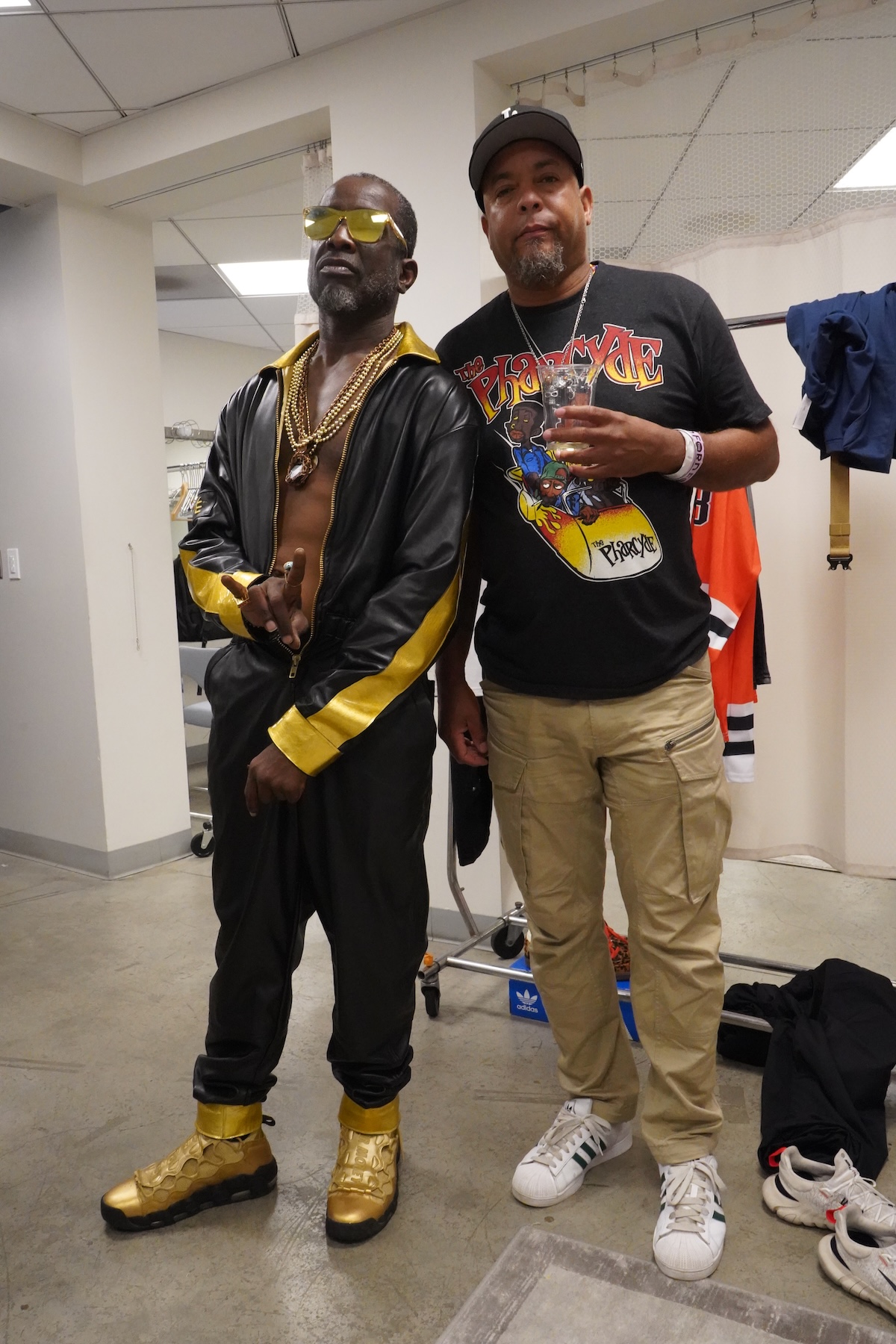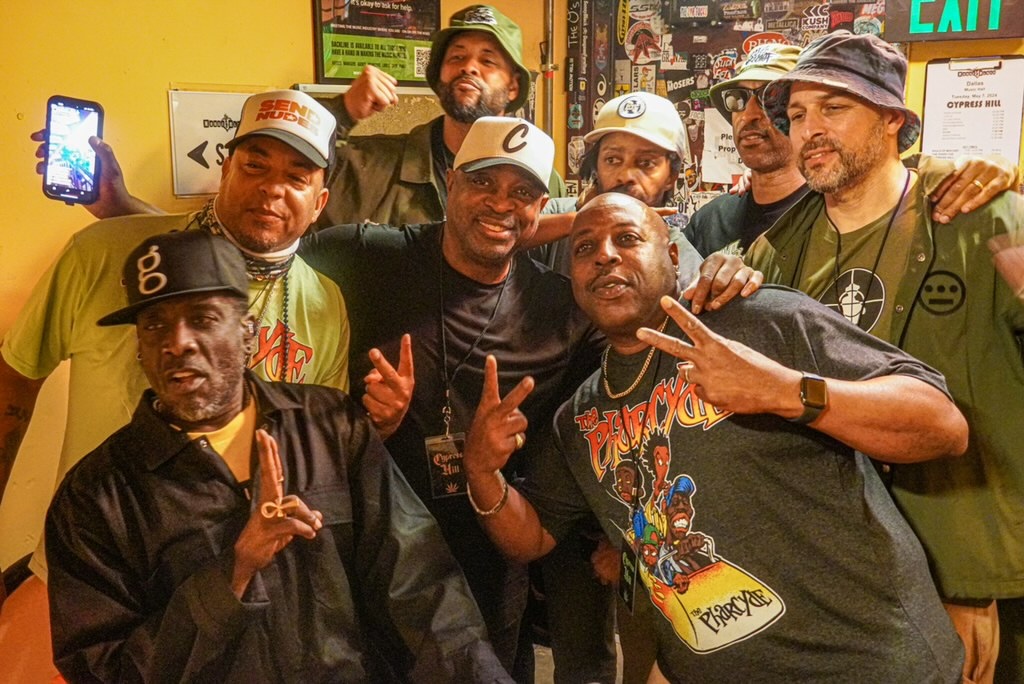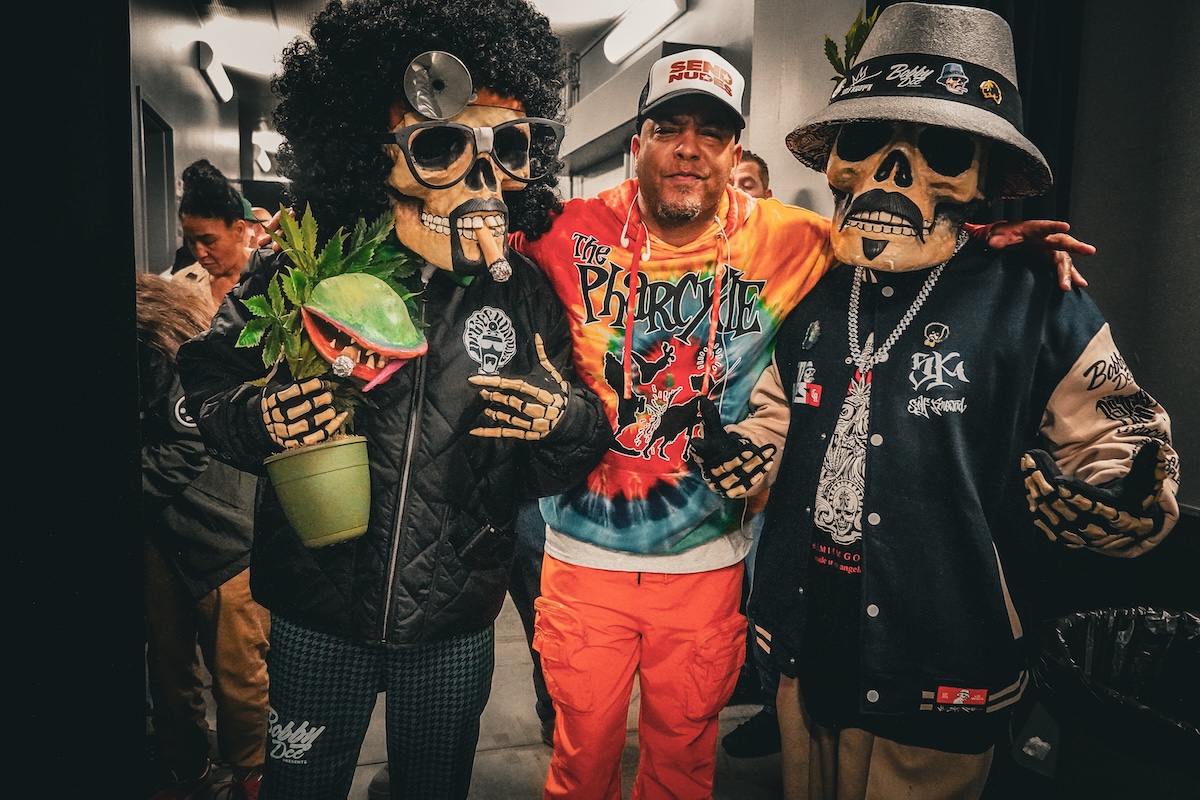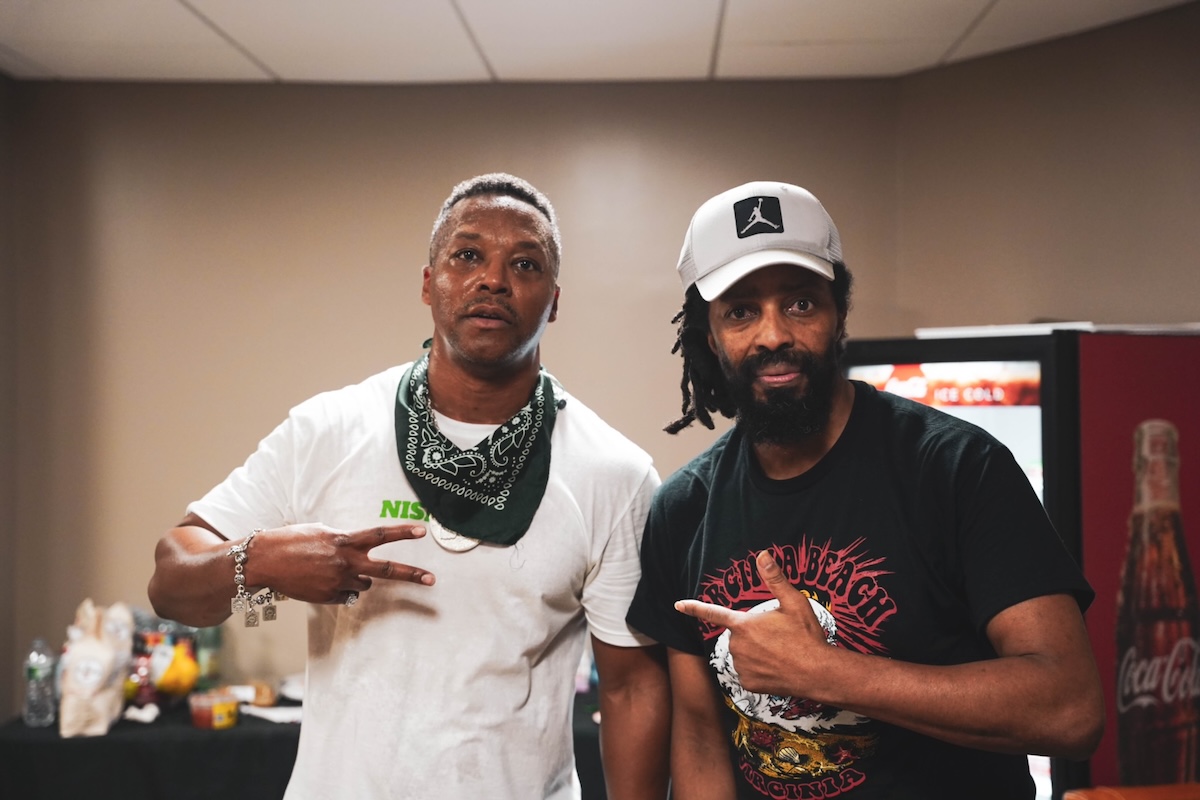It was 1991. The Pharcyde—Bootie Brown, Imani, Fatlip, and Slimkid3—were spending most of their time in Inglewood, California, at South Central Unit (SCU) studios recording demos, writing lyrics, and smoking copious amounts of weed. Around 5:00 p.m., when traffic was peaking in Los Angeles, the four of them would step outside and watch the girls drive by, which would soon become the inspiration for “Passin’ Me By.”
The track, which lives on the Pharcyde’s debut album, Bizarre Ride II the Pharcyde (1992), borrowed elements from songs like Eddie Russ’ “Hill Where the Lord Hides,” Quincy Jones’ version of “Summer in the City,” and Weather Report’s “125th Street Congress.” The combination, unlocked by producer J-Swift, proved to be a key to their longevity.
Barely out of their teens at the time, the Pharcyde helped lead West Coast hip-hop into a new era with their jazz-infused beats and a lyrical style that sharply contrasted the gangsta rap that dominated the 1990s. They were essentially doing for the West Coast what De La Soul, A Tribe Called Quest, and the Jungle Brothers were doing for the East.
“Passin’ Me By” was one of three songs from the demo tape they were shopping around to labels. It caught the attention of several majors, but they ultimately decided to sign the dotted line with Delicious Vinyl, home to rappers like Young MC, Tone Löc, and Masta Ace.
More than 30 years later, “Passin’ Me By” still resonates with generations of hip-hop fans. It was finally certified platinum in April 2025, adding another accolade to the group’s storied career. While Bootie Brown is no longer part of the original lineup, the Pharcyde has moved on as a trio, bringing their legacy to countless people around the world.
Speaking to SPIN, Fatlip, Slimkid3, and Imani dive into the creation of “Passin’ Me By,” the accompanying music video and how they feel when they perform it.
Remember the time
Fatlip: Life was a bowl of cherries in 1991. Actually, it was a bowl of buds. We was getting high, smoking and making beats. We was going to a lot of meetings about videos and a lot of record industry things that we were dealing with, doing a lot of shows. We were just fully in the business at that point and becoming somewhat rap stars on that escalation to rap stardom.
Slimkid3: We were in our early 20s. We were basically living at a studio in Inglewood. That’s where we spent the most time at—SCU.
Imani: We all had different houses and locations that we came from, but we spent the most time in Inglewood at a studio or at girlfriends’ houses, surrounding areas. In ’91, I was finishing my dance and videos career and shit. I had been dancing and teaching rap dance classes and doing anything that had to do with dance. Just anything. Literally, I was just going around people’s dance studios, trading off moves with people, getting in videos and all kinds of shit.
And the last video I did was the “Remember the Time” video with Michael Jackson. That was the last video that I did. And that was ’91. At the time, we were doing demos and recording with J-Swift and doing stuff like that. We hadn’t put the record out yet. We was just getting our demos together.
Delicious demo
Slimkid3: We recorded the first verse at SCU. We kept the verse that we recorded at SCU and transferred it to Hollywood Sound.
Fatlip: We did the chorus and had the beat, and that was what got us a record deal. “Passin Me By” was one of the three songs on our demo tape that got us attention with all the record labels.
Slimkid3: It had “Ya Mama,” “Passin’ Me By,” and “Officer.”
Fatlip: We talkin’ about Def Jam. We talkin’ about a lot of labels that aren’t even around today. But we talking about Motown. We was just young guys out here in L.A. trying to get a record deal, and we were actually on the verge of getting a record deal because we had been at this studio for a couple years.
Imani: A lot of labels wanted to sign us, so they took us out to dinners and shit, tried to swoon us, wine us and dine us and shit, and somehow Delicious Vinyl made their way to the front of the line because this dude named Lamar, he came to our studio and he was really geeked. He was like, “I’m going to take it to my dude,” and he took it to [Delicious Vinyl co-founder/owner] Mike Ross. The rest is history.
Fatlip: I think another factor with Delicious Vinyl was they didn’t want to keep our publishing. That’s what I remember.
Slimkid3: They gave us creative control and that was the most important thing to us because everybody was bidding pretty damn high, but it wasn’t really about the money as it was the creative control.
Imani: They also had this record that they was putting together called “Heavy Rhyme Experience” with the Brand New Heavies. They threw us a bone because they was like, “You guys could be on this record with all these big wigs.” It was like Gang Starr, Grand Puba, Black Sheep, Masta Ace, and we were the only group that wasn’t signed. When the record came out, you know, everybody was like, “Who is this Pharcyde?” The song was called “Soul Flower.”

Passin’ them by
Slimkid3: There was something we did every day at about 5 o’clock, during traffic time. We would all stand out on this little patch of grass in front of SCU, just watching the cars go by, watching the girls go by in these cars. It gave that “she keeps passing me by” feel. But it was something that we could all relate to, like going after the girl that is not giving you play or playing a role. Musically, there was this loop that J-Swift and probably Romye [Robinson] had found, and it was just looming throughout the studio.
It kind of put you in a trance a little bit, in deep thought, and you’re sitting there working on your lyrics and writing your lyrics. So once we got the GPS, it was like, “She keeps passing me by.” So I was like, “OK I got that story all day because it’s something that we do all the time.”

Boom Boom Pow!
Fatlip: There’s around 10 samples, if I’m not mistaken. J-Swift was our main producer, but we were all contributing input. But J-Swift was the the piano prodigy that knew the MPC drum machine like the back of his hand. So we was just giving him loops and records, and he was chopping them up. With “Passin Me By,” we had a bunch of records and he was going to make a bunch of beats with them. Then Bootie Brown was like, “Nah, you got to put those two records together.”
That main horn sample was Eddie Russ and the song is called “Hill Where the Lord Hides.” The other one is Quincy Jones’ “Summer in the City.” He put those two together and then “boom, boom, pow!”
Slimkid3: We had a living room area where we did choreography and stuff like that. The music looming through the different rooms, the record itself already gave you chills. It already gave you goosebumps.
I feel like this song kind of wrote itself, and you were just lucky enough to be a part of it. It’s almost like on a spiritual level, you were coloring by numbers to be a part of a hit. And then just the topic, “she keeps passing me by,” was extremely relatable. When Fatlip went in to sing the hook, that just took it to another level of goosebumps. I went in right after he finished and put the harmony on there, too. It just took off.
Fatlip: We had the beat playing over and over and over and over. I got to keep giving Bootie Brown his props. We was all in the room, he heard the melody and he was like, “Yo, this sounds like time keeps passing me by.” And then I was like, “What about she?”Then it was like, “Damn.” Everybody had a story about she. So we had the concept, right? That was really how we came up with all of our songs—with the chorus first.
Slimkid3: That’s that GPS.

Power Punch
Fatlip: We took a break, everybody went and did their own thing and I came back with that idea in my mind. Then I grabbed the mic and did it. And I listened to the first chorus, and I was like, “Damn that shit sound otherworldly.” Then I called Bootie Brown in the room.
I was like, “Yo, listen to this!” He didn’t even come all the way into the room. He just peeked his head in the room, and with no kind of excitement was like, “OK, finish the other two choruses” and walked out. So that’s what I did. Had he come in and been like, “Wow, this is crazy!” and tripped out with me, I probably would not have finished the other two choruses. I’m gonna be honest with you. I have never sang that shit like that again ever in my life.
Slimkid3: Fatlip was being honest. Everybody’s just being honest. Bootie Brown set it off, and then me and Imani was pretty much the cream filling in the middle. Then Fatlip brought it home.
Fatlip: You mean eight months later? [laughs]
Slimkid3: You always take a long time, but when it’s done, it’s done, and it’s dope. It just takes one person to be vulnerable, not care and just get on there and sing like that, or let everybody else know it’s OK to do that, too. Then we’ll start getting that soul music again that we’ve craved for so long.
Fatlip: We put out “Ya Mama” first. I don’t know how many months we promoted it. We did the video.
Slimkid3:We did it for quite a while.
Fatlip: It was a totally different situation from then and when we released “Passin’ Me By.”
Slimkid3: Don’t forget. “Ya Mama” was definitely chosen by that radio station in Washington, D.C. They jumped on “Ya Mama” quick and it was running with that. It was cool. We always put out music like we play pool. The shot that you’re shooting ain’t the shot that you worried about. You’re thinking about your third shot and what’s gonna back it up, so “Passin’ Me By” was a definite next shot to smash with it.
Fatlip: You’re right, because it’s kind of like, had we released “Passin’ Me By” first, who knows what would have happened? The fact that we came out so lighthearted and jokey-jokey, and then the next song was like, “Wait a minute.” It’s a power punch. It’s a groove behind it. Some funk.
Slimkid3: It always made you feel like,”What’s next?” So don’t put out your power punch first. Let the power punch come out second or third. But all your other songs should be good songs, too. You shouldn’t have album fillers.

Budget Schmudget
Slimkid3: The budget was alright.
Imani: “Ya Mama” was like $40,000 and we hated the video when it came out. It didn’t feel like it represented us. It was a part of us, but we felt like we wanted to be represented differently. We was all hands on deck for “Passin’ Me By.” Every single person had to add something. We had to take it back to where we started from. We went back to SCU. We incorporated a lot of the visions from everybody. Fatlip had the homie Sanji [Sanjeeva Senaka], who I think he used to go to school with. He directed the video. We was all coming from the same headspace and it was perfect from our perspective.
Fatlip: When the song had come out, people had heard it, so there were a lot of directors hitting us up. We were taking a lot of meetings and hearing a lot of concepts for what this video was going to be. And then there’s even some directors that went on to get Oscars, who at the time were like, “Yo, let me do this video.”
But then when the homie Sanji came with it, he came with these books that showed us like, “Oh, this is the black and white aesthetic that we’re going to use. We’re going to have you guys hanging upside down,” so we went with Sanji. There was this one director in particular. He was a little disappointed that he didn’t get to do the video, but I seen him after the video came out and he just was like, “Yo, you did that.” Coming from this director who, again, went on to get Oscars, it was a real compliment.
Imani: In comparison, nah, we didn’t have a big budget. People were still doing million-dollar videos or even $100,000 videos at the time. We weren’t doing nothing like that.
Slimkid3: I’ll say this. I don’t think we were really thinking about it. Creativity is expensive. We knew that. And back in the day, the technology wasn’t even there to give us what we were looking for as far as, let’s say, “Otha Fish.” The water was murky. It wasn’t as clear as we wanted it to be or whatever, but if we had the technology we have now, it would have been something different, and that was an expensive video. But I don’t think we were thinking about it monetarily at the time because we were just trying to make sure that the concept came across like it needed to be. In my perspective, I was not thinking about what something cost as opposed to, “Is this correct? Is this right? Is this set right? Is it edited on beat and tempo?”
Imani: Whatever the money or budget was, that’s what it was. It wasn’t like, “Yo, we need more money to do something” or “that’s not enough.” We didn’t have enough leverage to be like, “Yo, we want a lot of money.” They OK’ed the budget because we were their group. They’re spending the money. Second time we proved ourselves and let the leash go a little bit more, and then by the time “Otha Fish” came, it was like, “Hey man, OK. Boom.” We were able to do exactly what we wanted.

The Junkyard
Imani: Everything is funny and a memorable moment with that video.
Slimkid3: I feel like the funny moment was we were all in the backyard and there’s a car door. We were like, “What if we had Fatlip looking like he’s sitting in the car talking to a girl and then you pull back and it’s just the car door, and then all the homies stand in the back? We laughing about it.
Imani: We in a junkyard!
HINDSIGHT IS 20/20
Fatlip: To the label’s credit, it didn’t take much for them to side with us after—no pun intended—because we were very much going to push our ideas.
Imani: We couldn’t have done it without Delicious Vinyl.
Fatlip: We weren’t going to just stay quiet. They definitely heard us out. And even to this day, all we do is argue about what’s the right idea, what’s the right thing.
Imani: It was a certain vibe at Delicious Vinyl. None of this could have happened without Delicious Vinyl. We had such a vibe with them. In hindsight, it’s a lot easier to see, because when you’re creating greatness, it’s kind of hard to witness it being made. But it’s easier to look back in hindsight and you can appreciate shit. I see Mike Ross now, and the way I think about him now is not how I thought about him in 1995. Literally. I appreciate this man. He gave me opportunity. He had a thing going on, we had a thing going on and together, we culture clashed and made some shit for the ages. We couldn’t have did it without him. It was one of the coolest labels.
Slimkid3: The Pharcyde, as people see it and hear it, was more than just four people. It was definitely Delicious Vinyl, the staff, everybody. It was definitely all the people that made this thing happen. We were the eggs, milk, oil, and sugar that made this cake pop. It was definitely lit by the time people sunk their teeth into it.
2025 & BEYOND
Slimkid3: I feel good about the song. It’s like color by numbers once again. It’s not about us, it’s about the fans. When we’re giving this to the fans, we’re giving a thousand percent, like it’s our first and our last time to ever do this shit.
Imani: It’s not our music no more. It goes through us, but it’s not our music no more. We’ve grown, kids have grown up, it’s a part of their DNA now. I feel happy and honored to be on stage with these dudes.
Slimkid3: Yeah, same.
Imani: And to be able to do it, and then to see the people out there, you don’t even understand.
Fatlip: I love you, man!
Imani: I feel like I’m blessed.
Slimkid3: No, we are blessed. I feel like the thing that was a gift to us, we’re giving it to our fans as a gift to them when we’re performing it.
LOOK, MA!
Slimkid3: For me, it was like, “It’s about time.” I feel like the universe does shit to you. It’s like a hurry up and wait thing. Our focus was not for us to be platinum or not be platinum. It’s just to do what it is that we do. It’s timeless, and I have to say that. It’s so timeless that it took its time to get where it needed to go. And it shined on us today to extend the life of what it is that we do and what it is that we’re doing right now, which is a super blessing.
Imani: It’s dope that it went platinum, but if I have the opportunity to talk to the people that are actually in love with the music and they trust us enough to put their kids’ brains and souls into our hands, that means a lot to me.
Slimkid3: We made it!



